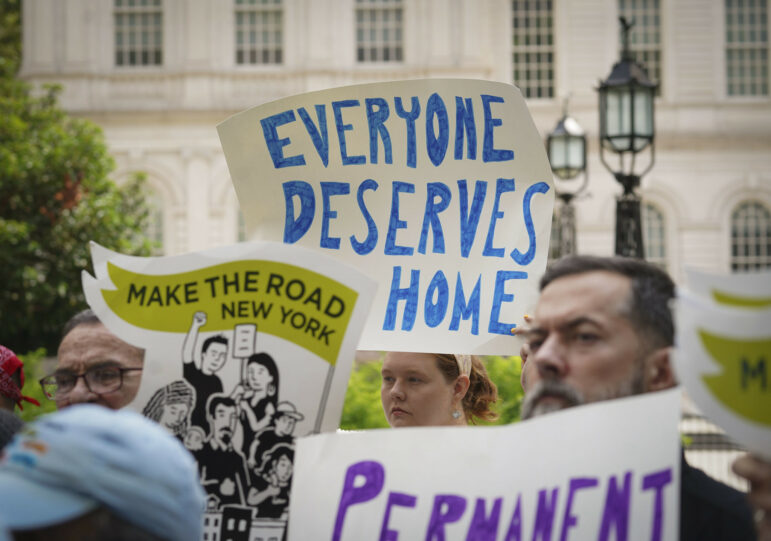“For mixed-status households, where at least one member of the family is not a U.S. citizen or eligible immigrant, it can be difficult—if not impossible—to access sufficient housing support.”

Gerardo Romo / NYC Council Media Unit
New York City lawmakers and advocates at a rally in July, calling for the expansion of CityFHEPs.In 2016, Celeste, an undocumented immigrant from the Caribbean, entered a domestic violence shelter along with her three children after her partner stabbed her multiple times. Due to a broken system for housing immigrant survivors of domestic violence, it took her more than three years to move to her own apartment.
After going into shelter, Celeste applied for a U Visa, a federal program intended to provide a pathway to citizenship to crime victims who help police catch the perpetrator. She was eventually able to apply for protection from deportation and a work permit. But six years have passed, and her case is still pending. Arbitrary visa caps and bureaucratic red tape have prevented her from rebuilding her and her children’s lives. Immigrants and survivors of domestic violence deserve better.
The recently introduced WISE Act would reduce the U Visa backlog and protect countless survivors like Celeste escaping from violent situations. It is imperative that the federal government moves quickly to pass it. But federal protections are only part of the solution—safe and stable housing is a key aspect of every survivor’s recovery, and New York leaders must ensure everyone, irrespective of their immigration status, can access it.
Domestic violence is the number one cause of family homelessness in New York City. It is critical that city and state leaders expand access to housing vouchers so that every domestic violence survivor can find a safe place to call home. Rental assistance programs can be life-saving resources for domestic violence survivors and their children. Housing subsidies lift about 1 million children from poverty each year, and kids who live in a stable, affordable home enjoy better health and educational outcomes and greater access to economic opportunities.
RELATED READING: Hundreds of Families Forced from Domestic Violence Shelters into Strained DHS System Each Year
For mixed-status households, where at least one member of the family is not a U.S. citizen or eligible immigrant, it can be difficult—if not impossible—to access sufficient housing support. Celeste’s family, for example, qualified for a rental assistance program, but since only her U.S. citizen children are eligible, the voucher amount was substantially decreased. Celeste was able to find a safe apartment with the help of New Destiny’s HousingLink program in 2019, yet countless other immigrant survivors are forced to languish in the shelter system with a prorated voucher that is impossible to use. For survivors in entirely undocumented households the situation is worse, since they do not qualify to receive any housing subsidy at all.
Fortunately, solutions to this issue exist: last legislative session, the New York State legislature introduced a bill that would expand the municipal CityFHEPS program, a housing subsidy for individuals and families in or at risk of entering the shelter system, to all eligible New Yorkers, regardless of their immigration status. This would ensure that no one must wait three years in a shelter, like Celeste and her family did, before finding a stable home.
And that’s not the only solution that would greatly expand housing access for immigrant survivors. The Housing Access Voucher Program (HAVP) is a $250 million initiative that would create a permanent, statewide rent subsidy available to all New York residents. This legislation would serve more than 13,000 households across the state. However, citing inflated cost estimates, Gov. Kathy Hochul opposed this measure during budget negotiations, which prevented its passage into law in 2023.
We cannot afford to miss this opportunity again. Programs like HAVP and CityFHEPS are the most economical way to house New Yorkers experiencing homelessness, including survivors of domestic violence. An analysis from WIN shows that a CityFHEPS voucher costs just $72 per night for a two-bedroom apartment. Similarly, HAVP would cost only around $50 per day. Considering that the city spends an average of $232 per day, or almost $85,000 annually, to house a family in shelter, investing in HAVP and CityFHEPS now could save New York millions, if not billions, every year.
As state leaders begin to prepare New York’s next budget, it is imperative that these programs are included. Not only does it make fiscal sense, but we owe it to the thousands of domestic violence survivors, as well as every other New Yorker, immigrant and non-immigrant alike, who desperately need permanent housing.
Celeste’s story is not unique—every day, thousands of families like hers continue to be stuck in shelter due to a lack of housing access programs for undocumented immigrants and their children. It is critical that we direct our state’s resources toward measures that can end the cycle of family homelessness and ensure that immigrants escaping from abusive situations can move quickly into stable housing.
Everyone, no matter where they come from, deserves a safe home.
Gabriela Sandoval Requena is a formerly undocumented immigrant and the director of policy and communications at New Destiny Housing, a nonprofit that provides housing and services to survivors of domestic violence and their children.








